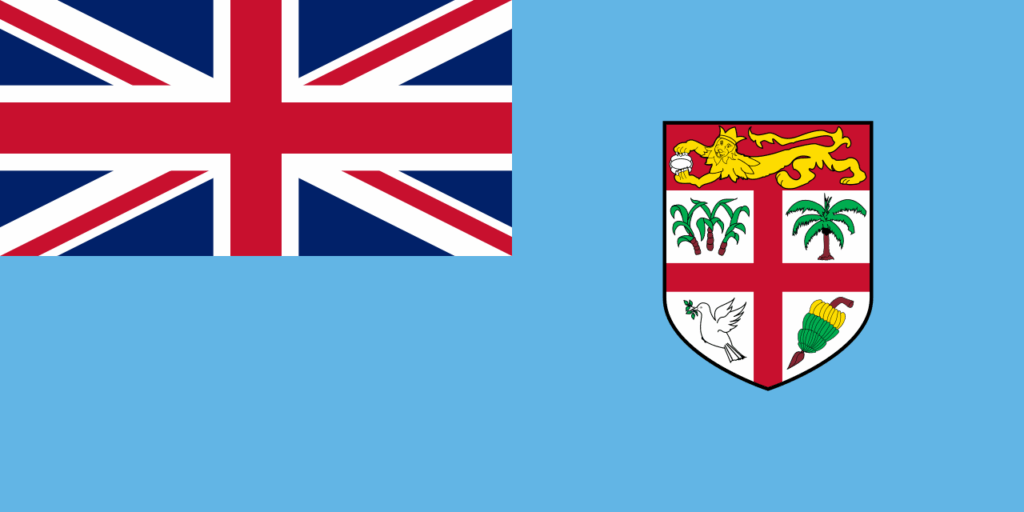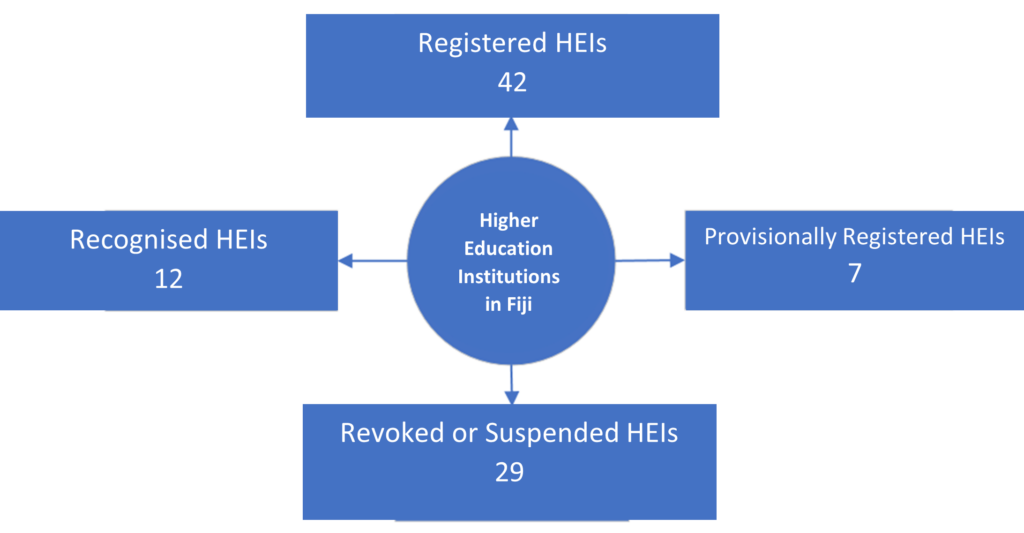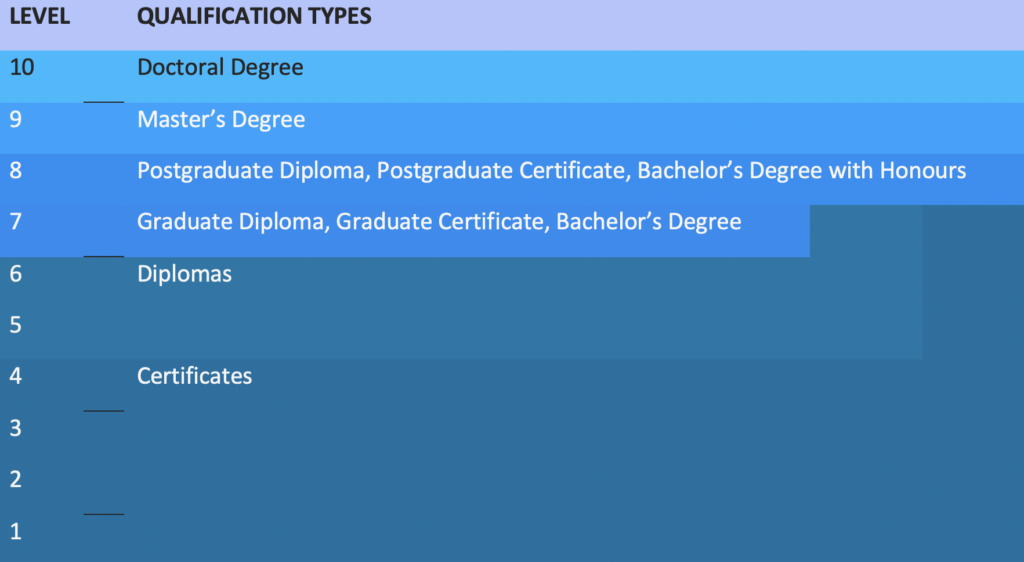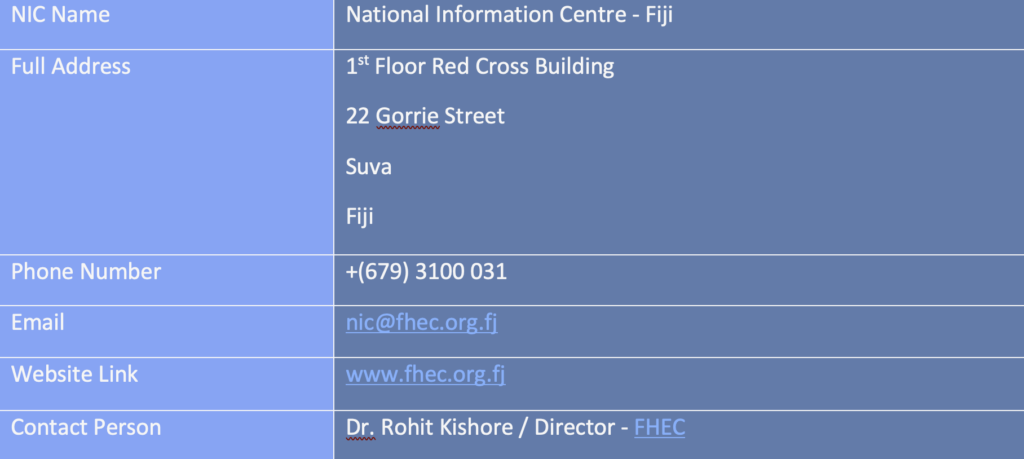Fiji

National Information Centre for – Fiji
1st Floor Red Cross Building
22 Gorrie Street
Suva, Fiji
Phone Number: (+679) 3100 031
E-mail: [email protected]
Website: https://www.fhec.org.jf
Contact Person: Dr. Rohit Kishore, Fiji Higher Education Commission (FHEC) Director
Education
Section 31 [Chapter 2 – Bill of Rights] of the Constitution of the Republic of Fiji, 2013 enshrines the right to education: “(1) Every person has the right to (a) early childhood education; (b) primary and secondary education; and (c) further education.” The Ministry of Education, Heritage and Arts is responsible for building a knowledge-based society by ensuring that Fijians have equitable access to high-quality education at all levels. is responsible for building a knowledge-based society by ensuring that Fijians have equitable access to high-quality education at all levels.
The Fijian education system is broadly structured into:
- School Education (Early Childhood Education, Primary, and Secondary Schools),
- Technical and Vocational Education and Training and Higher Education.
School Education
School education is similar across the country, guided by the Fiji National Curriculum Framework, commonly referred to as the NCF. It identifies six Foundation Areas of Learning and Development (FALD) for early childhood and seven Key Learning Areas (KLAs) for the primary and secondary levels of schooling. The curriculum is grouped into these areas and is described using essential learning outcomes for all students. English is the primary language of instruction in the education system.
School education is compulsory from Year 1 to Year 12 (primary and secondary) and is fully subsidised by tuition grants, including special and inclusive education grant for children with special needs enrolled in Inclusive or Mainstream Schools. This provision represents the government’s conviction that education is a priority in raising the standard of living of the people of Fiji. School education is administered and supervised by the Ministry of Education, Heritage and Arts and governed by the Education Act of 1966. for children with special needs enrolled in Inclusive or Mainstream Schools. This provision represents the government’s conviction that education is a priority in raising the standard of living of the people of Fiji. School education is administered and supervised by the Ministry of Education, Heritage and Arts and governed by the Education Act of 1966.
One of the strengths of the education system in Fiji is the support of communities and other controlling authorities in the establishment and funding of schools. This has been a major driving force in our high literacy rates, particularly in the essential years of schooling. Private primary and secondary schools also receive some government funding but are primarily funded through charging fees.
Early Childhood Education
The ECCE Tuition Subsidy Grant supports the Early Childhood Care and Education (ECCE) for standalone kindergartens or those attached to a primary school. ECCE is given to children between the ages of three and six years based on the Na Noda Mataniciva curriculum guidelines which set out the vision, beliefs, and values underpinning the conduct of early childhood education in the country, and presents a framework to guide teachers and stakeholders in developing effective early childhood programmes. This level of education is not compulsory, but each Fijian child is guaranteed a school place. There is a ratio of one teacher to every fifteen children.presents a framework to guide teachers and stakeholders in developing effective early childhood programmes. This level of education is not compulsory, but each Fijian child is guaranteed a school place. There is a ratio of one teacher to every fifteen children.
Primary Education
Primary schools are supported by the Free Education Grant (FEG). All Fijian children from 6 to 13 years of age (Year 1 to Year 8) must attend a primary school run by the government or social and religious organisations. Primary education aims to develop all children to their full potential by offering them the essential basic skills, knowledge, and attitudes they will need in society. Children appear for various examinations and assessments after Year 4: Language and Numeracy Assessment (LANA) in Year 5 and 7; Fiji Year 6 Examination (FY6E), Fiji Year 7 Final Examination (FY7FE), and Fiji Year 8 Examination (FY8E) after which they gain entrance to secondary schools.
Secondary Education
Like primary schools, secondary schools are also supported by the Free Education Grant (FEG). Secondary education is from 14 to 18 years of age (Year 9 to Year 13). Still, it is only compulsory until 17 years of age (Year 9 to Year 12). Students usually undergo a five-year programme enabling them to be enterprising, creative, productive, and law-abiding citizens and preparing them to enter higher education.
During the first two years (Year 9 – 10), students can develop essential knowledge, skills, and attitudes in a broad range of subjects of their choice to take the Fiji Year 9 Final Examination (FY9FE) and Fiji Year 10 Examination FY10E.
In the following two years (Year 11 – 12), based on ability, interest, and aptitude, students are guided by teachers to choose subjects for possible career pathways and prepare to take the Fiji Year 12 Certificate Examination (FY12CE).
Students continue to study in their chosen fields in the final year (Year 13) to prepare for the Fiji Year 13 Certificate Examination (FY13CE), which is recognised as a complete and credible qualification and accepted for entry into universities.







Technical and Vocational Education and Training and Higher Education
Technical and Vocational Education and Training (TVET) and higher education in Fiji comprises public, private, and regionally-owned universities and other non-university higher education providers. It plays a crucial role in providing learners with the skills that the 21st-century workforce requires, delivers world-class research and development, and has substantial international connections.
TVET is given particular attention and is acknowledged as a cornerstone of educational reform and supporting sustainable development. The TVET sector provides high-quality, internationally recognised training and is based on strong partnerships between governments, TVET institutions, and industry bodies. In the 2021-2022 budget, the Government has allocated approximately $1.5 million as tuition grants for students wishing to pursue studies in the TVET sector.
TVET and higher education institutions are regulated by the Fiji Higher Education Commission (FHEC) and guided by the Fiji National Qualifications Framework (FQF). These institutions are required by law to be recognised by and be registered with the FHEC if they are conferring awards which range from certificates to degrees. This translates to the ten levels on the FQF. The FHEC is mandated to regulate, develop, and promote the TVET and higher education sector in accordance with its eleven mandated functions. This includes regulating TVET and higher education and institutions’ operations and the programmes they offer to ensure the delivery of high-quality programmes and their resulting qualifications.
Universities in Fiji deliver degree, postgraduate and doctoral qualifications. Most are well-recognized internationally, have strong international connections, and collaborate with universities in other countries on a range of research and teaching programmes.
TVET can be undertaken in schools, industry, vocational schools, and all TVET providers (including technical training institutes). Delivery modes include full-time, part-time, online and distance education, apprenticeships, and traineeships. In response to the COVID-19 pandemic, the Australia Pacific Training Coalition, Fiji National University, and the FHEC developed the TVET Remote Delivery in a Crisis: A Guideline for Fiji TVET providers to deliver TVET if a crisis occurs. In consultation with crucial TVET stakeholders and Fijian government ministries, it was formulated primarily on the delivery experiences of Fiji TVET providers during the global COVID-19 pandemic in 2020 and including a rapid literature review of relevant experiences from other developing countries.
The FHEC provides extensive information on higher education.






In accordance with the Higher Education Act 2008, the Higher Education Regulations 2009, and the Higher Education (Qualifications) Regulations 2010, the Fiji Higher Education Commission (FHEC) is established as a body corporate with perpetual succession and a common seal with eleven mandated functions as stipulated in section 7 of the Act and reports directly to the Minister for Education, Heritage and Arts and is responsible for regulating the establishment, recognition, registration, operation, and standards of higher education institutions (HEIs).

This section provides an overview of the quality assurance mechanisms in place and the national education bodies that are involved with higher education along with a brief statement about the role of the national education body.
Fiji Higher Education Commission
The Fiji Higher Education Commission (FHEC) is the government-mandated regulatory and quality assurance body for higher education in the country. The FHEC oversees the development and improvement of higher education in Fiji with the aim of ensuring that learners have the best possible opportunity to gain relevant qualifications required to support and sustain Fiji’s economic and social prosperity. The FHEC regulates the registration and operation of all higher education institutions, ensuring they meet quality standards and guidelines that reflect national and international imperatives. It is also responsible for establishing and maintaining the Fiji National Qualifications Framework (FQF) which enable Fiji qualifications to be measured both in Fiji and internationally. The FHEC was established as a statutory body in 2010 under the Higher Education Act 2008. Under the Act, Higher Education refers to all post-secondary school learning opportunities in Fiji.
Fiji Qualifications Council
The Fiji Qualifications Council was established to implement and maintain a Fiji National Qualifications Framework (FQF). The FQF stands as a beacon and reference for socio-economic planning. The Council is guided by the Higher Education (Qualifications) Regulations 2010. The Council is also responsible for the development, implementation and maintenance of the criteria and processes for the accreditation and registration of qualifications and ensuring that national standards and registered qualifications are internationally compatible.
Industry Standards Advisory Committees
The HEC’s Industry Standards Advisory Committees (ISACs) comprise individuals with professional standing and experience in their various trades and professions who are appointed by the HEC to develop National Qualifications in Levels 1 – 6 on the FQF. Membership is drawn from industry, professional associations, accrediting agencies and Higher Education Institutions. ISAC members are trained and registered by the FHEC and they ensure that training and assessment meet industry requirements and that each qualification outlines the minimum number of unit standards a learner must achieve in any particular field.
Ministry of Education, Heritage and Arts
The Ministry of Education, Heritage and Arts is the Government’s lead advisor on the education system, shaping direction for education agencies and providers and contributing to the Government’s goals for education. The ministry is responsible for implementing, monitoring, and evaluating Fiji’s educational legislations, policies, and plans and providing structure, human resources, budget, and administrative and managerial support to ensure that services are maintained at a high level.
Tertiary Scholarships and Loans Services
Tertiary Scholarships and Loan Services (TSLS) is responsible for ensuring transparent and accountable management of Fijian government funding provided for tertiary scholarships and loans.
The TSLS manages the Tertiary Education Loans Scheme (TELS), a fund intended to provide finance to Fijian students who have qualified for higher education at approved institutions in a TSLS eligible programme but are unable to support themselves financially. The TELS provides student’s zero or low interest loans to eligible Fijians to enable them access to local Higher Education, and is restricted for up to the first Bachelor’s Degree.
The TSLS also manages the National Toppers Local Scholarship Scheme and Scholarship Scheme for Students with Special Needs.
The Fiji National Qualifications Framework (FQF) is a way to ensure that education reforms at all levels can be strategically linked. The framework establishes a platform for setting the direction of education and training in Fiji for the foreseeable future. It clarifies how competencies and qualifications relate to each other at different levels, and it establishes learning pathways that will enhance learner mobility and stimulate progression and career development. The FQF was introduced in 2011 and then reviewed in 2017.
The Fiji Qualifications Council (FQC) is the custodian of the FQF and is mandated to develop, implement, and maintain the criteria and processes for the accreditation and registration of qualifications on the FQF.
The FQF is a ten-level framework. Descriptions for levels are based on complexity, with level one being the simplest and level ten the most complex. Each level has designated qualification types: certificates, diplomas, or degrees. Each qualification type is defined by an agreed set of criteria, which includes the qualification type title, the level at which the qualification type is listed, and the number of credits required at each level.
The FQF continues to evolve as a unified framework to suit the needs of education and training in the nation.
The FQF Levels

Qualification Types
Certificate
Level 1 includes the ability to demonstrate and/or work with basic knowledge in a subject/discipline.
Level 2 includes the ability to demonstrate and/or work with basic knowledge in a subject/discipline which is mainly factual.
Level 3 includes the ability to demonstrate and/or work with basic knowledge in a subject/discipline which is mainly factual but has some theoretical component.
Level 4 includes the ability to demonstrate and/or work with generalised knowledge of a subject/discipline.
Diploma
Level 5 includes the ability to demonstrate and/or work with a broad knowledge of the subject/discipline in general.
Level 6 includes the ability to demonstrate and/or work with a broad knowledge of the scope, defining features, and main areas of a subject/discipline.
Graduate Diploma, Graduate Certificate, Bachelor’s Degree
Level 7 includes the ability to demonstrate and/or work with a broad and integrated knowledge and understanding of the scope, main areas and boundaries of a subject/discipline.
Postgraduate Diploma, Postgraduate Certificate, Bachelor’s Degree with Honours
Level 8 includes the ability to demonstrate and/or work with knowledge that covers and integrates most of the principal areas, features, boundaries, terminology, and conventions of a subject/discipline.
Master’s Degree
Level 9 includes the ability to demonstrate and/or work with knowledge that covers and integrates most, if not all, of the main areas, of a subject/discipline, including their features, boundaries, terminology, and conventions.
Doctoral Degree
Level 10 includes the ability to demonstrate and/or work with a critical overview of a subject/discipline including critical understanding of the principal theories, principles, and concepts.
National Information Centre (NIC) Information and Activities
National Information Centre – Fiji
Fiji ratified the Asia-Pacific Regional Convention on the Recognition of Qualifications in Higher Education (2011) on Wednesday 27 August 2020. As a signatory of the regional convention, the main goal of Fiji’s NIC is to be a one-stop-shop for higher education information in Fiji. The Fiji Higher Education Commission (FHEC) oversees it. The National Information Centre – Fiji acts as a focal point for the dissemination of information and provision of advice to both local and international students on higher education opportunities in Fiji, higher education institutions (HEIs), programmes and courses available, and other relevant information falling under its ambit.
The National Information Centre – Fiji also serves as the National Register for Fiji Higher Education providing information to stakeholders on the higher education institutions and qualifications (and their levels) registered on the Fiji National Qualifications Framework that have met the quality assurance standards set by the FHEC. It also provides the minimum entry requirements for programmes offered by HEIs in Fiji. Information about suspended and revoked HEIs is also available on the National Information Centre – Fiji.
National Information Centre – Fiji inter alia therefore:
- captures education traditions, systems, and values of Fiji,
- provides information on quality assurance and accreditation, and qualifications framework, and
- guides both local and international students on higher education opportunities in Fiji.
Information available on the platform:
- Description of the Fijian Education System
- Detailed Description of the Fijian Higher Education System
- Quality Assurance Systems for Higher Education Institutions as well as Accreditation and Programmes
- The Framework for organising Higher Education Qualifications
- Procedures for the Recognition of Foreign Qualifications

Work plan for a sustainable NIC – Fiji
| Activities | Timeline |
| Launch of the National Information Centre – Fiji (NIC-Fiji) | Mid May 2022 |
| Submit country profile and work plan for sustainable NIC-Fiji to UNESCO | 30th April 2022 |
| Develop agreements with relevant national organisations and agencies to facilitate the analysis of cross-border mobility flows. | To be confirmed |
| Develop qualification recognition arrangements with other countries starting with Australia and New Zealand. | To be confirmed |
| Collect and disseminate data in the NIC-Fiji on outbound Fijian students and inbound international students | To be confirmed |
| Provide information on Fijian-Government supported student mobility programmes on the NIC-Fiji. This to be further extended to include Fijian student mobility programmes offered by other international countries and organisations. | To be confirmed |
| Strengthen the legislative mandate and the functioning of the NIC-Fiji. (This to be achieved through the Higher Education Legislative Review) | To be confirmed |
| Promote the APNNIC and NIC-Fiji at the national and regional level. | On-going |
| Develop and implement plans for Fiji’s ratification of the Global Convention | To be confirmed |
NIC-Fiji Logo Brief
Higher Education Institutions (HEI) Landscape and Mobility
Recognition is status awarded to an institution that possesses features of a higher education institution and meets the minimum criteria prescribed in the Higher Education Act 2008 and in Part 3 of the Higher Education Regulations 2009. Further details on the recognition criteria and process are available here.
Registration refers to issuing a certificate of registration to a higher education institution the meets the registration criteria prescribed in the Higher Education Act 2008 and in Part 4 of the Higher Education Regulations 2009 by the FHEC. Further details on the registration criteria and process are available here.
Guest User
Are there any recognized TVET institutions under FHEC (or other recognized programs) to include in the list? As long as the institutions fall under the Tokyo Convention’s mandate in Fiji, it could be helpful to list them.
Saved Yusuf
Suggest to keep this as List of HEIs. The link to the NIC-Fiji page will list out all HEIs in Fiji (inlcuding those that have been revoked or suspended).
In Fiji, for a HEI to operate they will need to be recognized and registered with HEC. List of recognised HEIs is also available on the NIC-Fiji.
Link to this to NIC-Fiji:
https://staging.fhec.org.fj/nic
Assessment of Foreign Qualifications
The Fiji Higher Education Commission (FHEC) conducts assessment of foreign qualifications in accordance with Regulation 23 (1) and (2) of the Higher Education (Qualifications) Regulations 2010. The HEC’s policy on Assessment and Recognition of Foreign Qualifications provides more information on this.
The purpose of the assessment of foreign qualifications is to ensure that the foreign qualification is authentic and recognized in the country of the award and to determine its comparable level on the Fiji National Qualifications Framework (FQF).
The assessment of a foreign qualification for use within Fiji shall be deemed complete after the following have been met:
- the foreign qualification has been authenticated by the awarding higher education institution and the responsible regulatory and/or quality assurance agency; and
- the foreign qualification has been evaluated against the FQF.
The fees for assessment of a foreign qualification are prescribed below:
- FJD 100/ course, unit, component for a Certificate, Diploma, Bachelor’s degree, Graduate Certificate, Graduate Diploma; *Qualifications levels 1 – 7
- FJD 150/ course unit, component for a Bachelor Honours, Postgraduate Certificate, and Postgraduate Diploma;
- FJD 200/ course, unit, component for a Master’s degree; and
- FJD 300/course, unit, component for a Doctoral degree.
There are possible requirements regarding the translation of non-English documents.
- An original or certified copy of the award certificate(s) in English or an official English translation (if the language of instruction is non-English)
- An original or certified copy of the testamur(s) or transcript(s) in English or an official English translation (if the language of instruction is non-English)
- An original or certified copy of the legal document in English to support name change (if applicable), e.g., marriage certificate
- Copy of the learning outcomes in English or an official English translation (if the language of instruction is non-English) with levels and credits of all courses/ subjects studied.
For Interested individuals/parties such as students, employers, recognition, regulatory, and/or quality assurance authorities or agencies, please email FHEC on [email protected]. The FHEC team will do the needful.
Tertiary Scholarships and Loan Services (TSLS) is responsible for ensuring transparent and accountable management of Fijian government funding provided for tertiary scholarships and loans.
The TSLS manages the following scholarships and loan schemes for Fijians to access technical and vocational education and training and higher education:
Scholarships
These are full scholarships only for the top ranked students who have completed their Year 13 or such equivalent studies as determined by the TSLS Board in the year preceding the award year.
These are fully funded Fijian Government Scholarships for students with special needs for studies in Fiji.
These are foreign government funded bilateral or unilateral scholarships made available for Fijians for overseas studies which are either fully or partially administered by TSLS. Unilateral Scholarships are those where 100% of all cost are borne by the Donor Funding Agency. Bilateral Scholarships are those where there is cost sharing between Donor Agencies and The Fijian Government.
Loan Schemes
TELS a fund intended to provide finance to Fijian students who have qualified for higher education at approved institutions in a TSLS eligible programme but are unable to support themselves financially. The TELS provides student’s zero or low interest loans to eligible Fijians to enable them access to local Higher Education, and is restricted for up to the first Bachelor’s Degree.
- TELS for Public Sector Employee
- TELS for Private Sector Employee
- TELS for TVET-FNU
- TELS for Accommodation Support Scheme
Ministry of Civil Service
The Ministry of Civil Service coordinates a wide range of learning and development courses locally and internationally to meet the identified core skill needs of the Fijian Civil Service.
